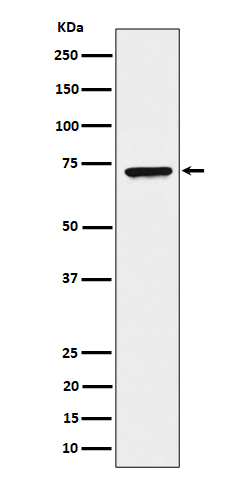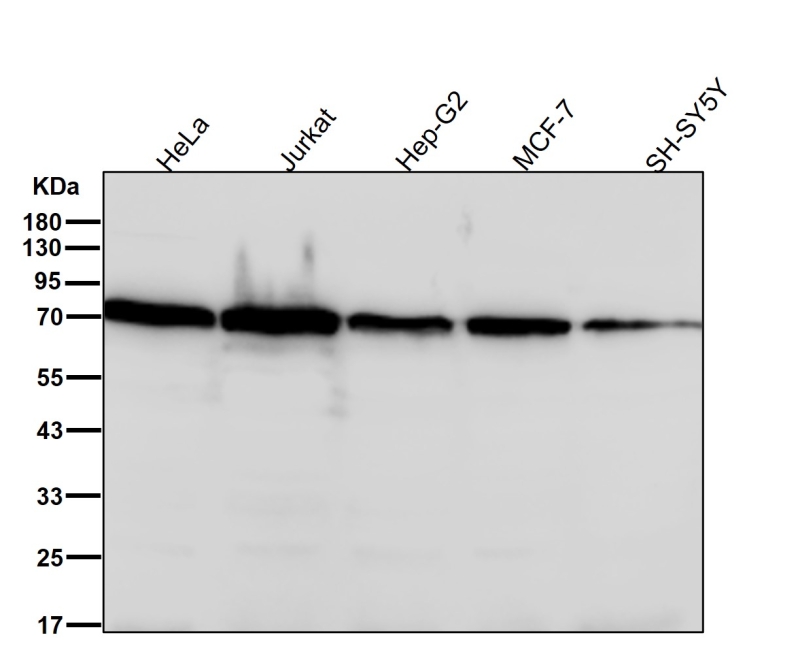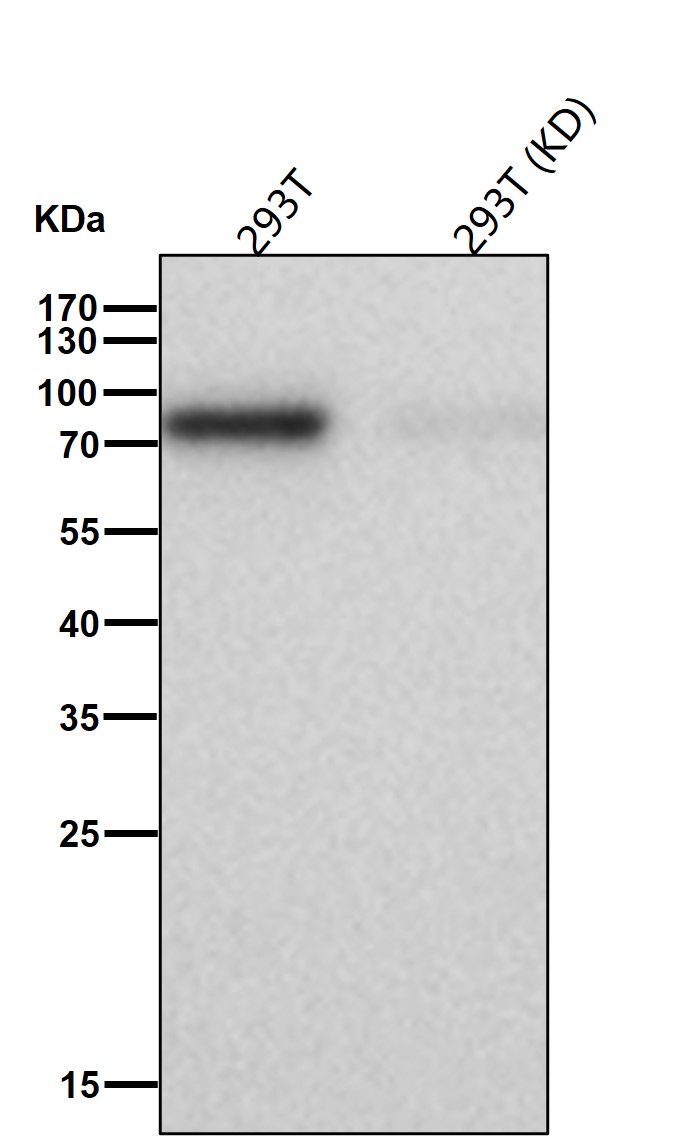


| WB | 咨询技术 | Human,Mouse,Rat |
| IF | 咨询技术 | Human,Mouse,Rat |
| IHC | 咨询技术 | Human,Mouse,Rat |
| ICC | 技术咨询 | Human,Mouse,Rat |
| FCM | 1/20-1/100 | Human,Mouse,Rat |
| Elisa | 咨询技术 | Human,Mouse,Rat |
| Aliases | CTP synthase 1; CTPS; IMD24;;CTPS1 |
| WB Predicted band size | Calculated MW: 67 kDa ; Observed MW: 72 kDa |
| Host/Isotype | Rabbit IgG |
| Antibody Type | Primary antibody |
| Storage | Store at 4°C short term. Aliquot and store at -20°C long term. Avoid freeze/thaw cycles. |
| Species Reactivity | Human,Mouse |
| Immunogen | A synthesized peptide derived from human CTPS1 |
| Formulation | Purified antibody in PBS with 0.05% sodium azide,0.05% BSA and 50% glycerol. |
+ +
以下是3-4篇关于CTP合成酶(CTPS/CTPsynthase)及其抗体的代表性文献摘要(基于公开研究整理):
---
1. **文献名称**:*CTP synthase is required for focal adhesion integrity through its role in actin polymerization*
**作者**:Ingerson-Mahar, M., et al.
**摘要**:本研究利用CTPS特异性抗体,通过免疫荧光技术揭示了CTP合成酶在细胞骨架调控中的作用,发现其通过调控肌动蛋白聚集体影响黏着斑稳定性,并依赖其催化活性维持细胞迁移能力。
---
2. **文献名称**:*Targeting CTPS1 to reprogram nucleotide metabolism and restrict leukemia progression*
**作者**:Liu, Y., et al.
**摘要**:通过Western blot和免疫组化技术,研究者使用抗CTPS1抗体证明其在急性髓系白血病(AML)中高表达,靶向抑制CTPS1可降低胞内CTP水平并诱导白血病细胞凋亡,提示其作为潜在治疗靶点。
---
3. **文献名称**:*Filament formation by metabolic enzymes: A structural perspective on CTP synthase polymerization*
**作者**:Zhou, Z., et al.
**摘要**:通过抗CTPS抗体的共聚焦显微成像和免疫电镜分析,揭示了CTP合成酶在营养缺乏条件下形成细胞质丝状结构的分子机制,并解析其动态组装与核苷酸代谢调控的关联。
---
4. **文献名称**:*CTP synthase knockdown induces genomic instability via altered chromosome segregation*
**作者**:Noree, C., et al.
**摘要**:研究利用CTPS抗体进行RNA干扰验证和蛋白质表达定量,发现CTPS缺失导致染色体分离异常和基因组不稳定,强调了其在维持DNA复制保真性中的非经典功能。
---
以上文献涵盖了CTPS在细胞骨架、癌症治疗、结构动态及基因组稳定性中的研究,均涉及抗体的实验应用(如定位、定量或功能验证)。如需具体论文链接或补充年份/期刊信息,可进一步说明。
CTP synthase (CTPS) is a metabolic enzyme that catalyzes the conversion of uridine triphosphate (UTP) to cytidine triphosphate (CTP), the final step in de novo pyrimidine biosynthesis. This ATP-dependent reaction is critical for nucleotide metabolism, supporting DNA/RNA synthesis and cellular proliferation. CTPS activity is tightly regulated and often upregulated in rapidly dividing cells, including cancer cells, making it a potential therapeutic target. Antibodies targeting CTPS are widely used in research to study its expression, localization, and regulatory mechanisms under physiological or pathological conditions.
CTPS antibodies are employed in techniques like Western blotting, immunofluorescence, and immunohistochemistry to assess protein levels in tissues or cell lines, particularly in cancer, immune disorders, or viral infection studies. Some antibodies detect specific post-translational modifications (e.g., phosphorylation) that modulate CTPS activity or filament formation—a unique structural feature linked to enzyme regulation. Additionally, these antibodies help investigate CTPS inhibitors in preclinical models, exploring their impact on nucleotide depletion and cell cycle arrest. Recent studies also highlight CTPS’s role in immune cell function and antiviral responses, expanding the antibody’s utility in immunometabolism research. Validation of CTPS antibodies includes testing in knockout models or enzyme activity assays to ensure specificity, given homology with other glutamine-dependent amidotransferases.
×